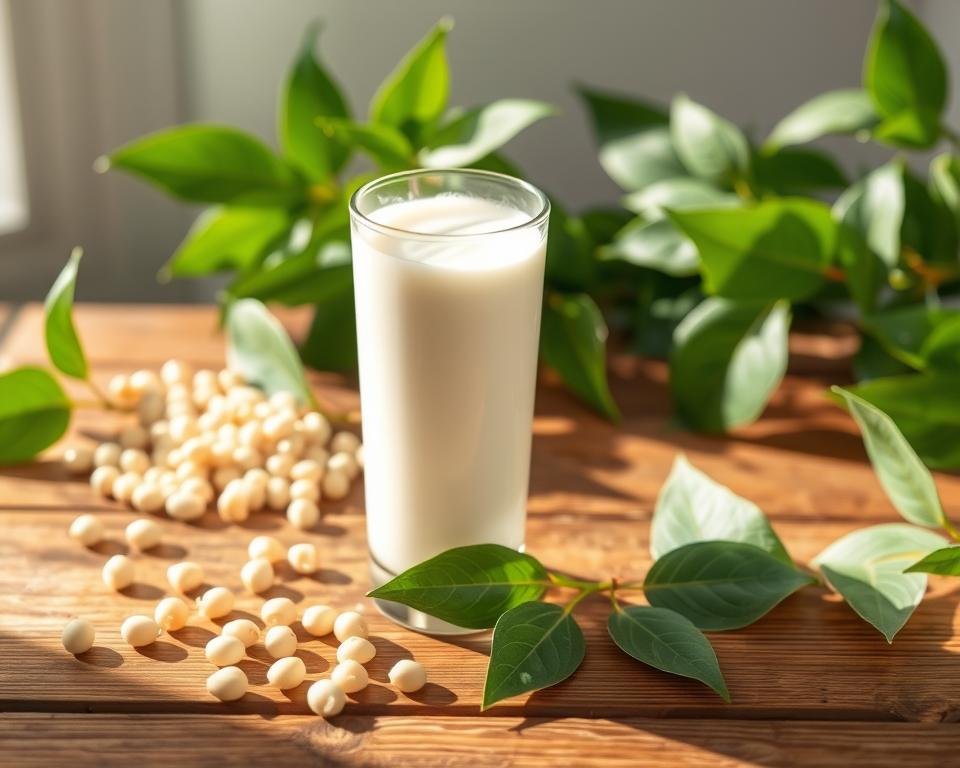Soy milk is a safe choice for dogs in small amounts. It comes from soybeans, a plant from East Asia. Dogs can digest it well, but too much can cause health problems.
It’s key to know the nutritional value and risks of soy milk. Also, there are other options for your dog’s diet.
Soy milk is a protein source for many, including vegetarians and vegans. It’s used in soy milk, oil, tofu, and more. Dogs can eat soy, but watch for signs of allergy or intolerance.
Soy milk is not harmful to dogs in small amounts. But, some dogs might have trouble digesting it. Always check with a vet before changing your dog’s diet.
Understanding Soy Milk and Its Components
Soy milk comes from soybeans, a type of legume. It’s packed with nutrients like minerals, B vitamins, and fiber. It also has potassium, essential fatty acids, amino acids, folic acid, and phytic acid. Some say it’s not as easy for dogs to digest as animal proteins.
What is Soy Milk Made From?
To make soy milk, soybeans are soaked and ground. Then, the liquid is strained to get the milk-like substance. This drink is creamy, with a nutty taste, and is loved by many as a dairy alternative.
Nutritional Profile of Soy Milk
Soy milk is full of good stuff. It has lots of protein and B vitamins. It also has fiber, potassium, and essential fatty acids. These nutrients could be great for dogs, but only in small amounts and if they can handle it.
Common Additives in Commercial Soy Milk
Commercial soy milk might have added sugars, flavors, or other things that aren’t good for dogs. Always check the label for xylitol, which is toxic to dogs. The safest choice is plain, unsweetened soy milk.

| Nutrient | Soy Milk | Cow Milk | Almond Milk |
|---|---|---|---|
| Protein (g) | 4 | 8 | 1 |
| Fat (g) | 4 | 8 | 2.5 |
| Carbohydrates (g) | 4 | 12 | 1 |
| Calcium (mg) | 300 | 276 | 450 |
| Vitamin D (IU) | 120 | 120 | 0 |
Can Dogs Have Soy Milk: Benefits and Risks
Feeding soy milk to dogs is not a simple yes or no. It can offer some benefits but also has risks. Let’s explore the good and bad sides of soy milk for dogs.
The benefits of soy milk for dogs include its protein and nutrient content. Soy is a great plant-based protein that can add to a dog’s diet. It’s also lactose-free, which is good for dogs with dairy allergies.
But, soy milk also has risks. Some dogs may be allergic to soy, leading to skin issues, digestive problems, or hormonal imbalances. Too much soy milk can also upset a dog’s stomach.
- Soy milk can be a source of protein and nutrients for dogs, but it may also trigger allergic reactions.
- Soy milk is a lactose-free alternative, making it suitable for dogs with dairy sensitivities.
- Excessive consumption of soy milk can lead to digestive issues in dogs.
Introducing soy milk to your dog’s diet should be done slowly and with careful watch. If your dog shows signs of discomfort or allergy, talk to your vet before continuing soy milk.

Deciding to add soy milk to your dog’s diet should be done with caution and advice from your vet. Knowing the benefits and risks helps you make a choice that’s best for your dog’s health.
Signs of Soy Sensitivity in Dogs
While soy products, including soy milk, are safe for dogs in small amounts, some dogs may react badly. Look out for signs like constant licking, hair loss, and diarrhea. Vomiting and ear infections are also red flags.
Other signs of soy sensitivity include swollen bellies, dehydration, and sudden weight loss. Dogs might also itch, drink too much water, pass gas a lot, or seem very tired. If these problems don’t go away, see a vet right away.
When to Consult Your Veterinarian
Allergic reactions to soy can be mild or serious. If your dog shows signs like hives, severe stomach issues, or trouble breathing, get help fast. A vet can figure out what’s wrong and treat it, possibly with medicine.
Allergic Reactions and Their Management
If your dog has a soy allergy, remove soy from their diet. Make sure other foods don’t have soy in them too. Your vet can help you find safe foods and teach you how to read labels.
“Soy allergies in dogs can be diagnosed through food trials, which involve an elimination and challenge phase to identify and confirm the allergen.”
How Much Soy Milk Can Dogs Safely Consume
When it comes to soy milk and our canine companions, moderation is the key. Dogs can safely have small amounts of soy milk. It’s important to introduce it slowly and watch how your dog reacts.
A few tablespoons of soy milk as an occasional treat is usually okay for most dogs. But too much can cause digestive problems, weight gain, or other health issues. Always talk to your vet before changing your dog’s diet, as needs and sensitivities can vary.
Signs of soy sensitivity in dogs include obsessive licking, hair loss, diarrhea, vomiting, and frequent ear infections. Some dogs might need to avoid soy in their food and human products like soy sauce, which can be harmful due to its high sodium content.
Tofu is not toxic for dogs, but eating too much can lead to bloat, a serious condition. Soybeans and edamame beans can be given in small, plain amounts. But eating too much can cause stomach upset.
In summary, when it comes to soy milk for dogs, a little is okay. Soy milk is easy for dogs to digest and can be a safe treat in small amounts. But, it’s important to watch your dog’s reaction and talk to your vet to keep them healthy and happy.

Comparing Soy Milk to Other Plant-Based Alternatives
Pet owners looking for milk alternatives for their dogs should know the pros and cons of each. Soy milk is a favorite, but it’s good to compare it with almond milk, oat milk, and coconut milk.
Almond Milk vs. Soy Milk for Dogs
Almond milk is okay for dogs in small amounts because it’s low in calories and fat. But, some dogs might find it hard to digest. It has vitamins A and E but less calcium than soy milk. Make sure to pick unsweetened almond milk to avoid added sugars that can harm dogs.
Oat Milk as an Alternative
Oat milk is safe for dogs and has fiber, B-vitamins, vitamin D, and calcium. But, too much can upset their stomachs. Always choose unsweetened oat milk and introduce it slowly to see how your dog reacts.
Coconut Milk Benefits and Drawbacks
Coconut milk can make a dog’s coat and skin better and boost their immune system. But, it’s high in calories and fat, so give it in small amounts. Be careful with the fat and calorie content when using coconut milk for your dog.
When adding plant-based milk to your dog’s diet, make sure it’s free from xylitol. Also, these milks might not have the same nutrients as cow’s milk. Always watch your dog’s health and talk to your vet for advice.
The Role of Dairy in a Dog’s Diet
Dogs can enjoy cheese and plain yogurt as treats sometimes. But, milk itself should be limited in a dog’s diet. Most dogs can’t digest milk sugars well because they lack the needed enzymes.
Drinking cow’s milk or goat’s milk can upset a dog’s stomach. They might vomit, have diarrhea, feel bloated, or have pain in their belly. This happens because their body can’t break down the milk sugars properly.
Puppies can handle milk better when they’re nursing because they have lots of lactase enzyme. But, as dogs grow up and start eating solid food, they often can’t digest dairy well anymore.
| Dairy Product | Lactose Content | Recommended Intake for Dogs |
|---|---|---|
| Cow’s Milk | High | Limited to a few tablespoons as an occasional treat |
| Goat’s Milk | Moderate | Limited to a few tablespoons as an occasional treat |
| Cheese | Low | Small amounts as an occasional treat |
| Plain Yogurt | Low | Small amounts as an occasional treat |
Many people wonder if can dogs have milk and dairy for dogs. The answer is yes, but milk should be limited in a dog’s diet because it can cause stomach problems. Plant-based milk alternatives like almond, oat, or coconut milk might be better for dogs that can’t digest lactose. But, they should also be given in small amounts.
Water is the best choice for keeping dogs hydrated. Milk and other dairy products should only be given as treats, not as a regular part of their diet.
Understanding Lactose Intolerance in Dogs
Lactose intolerance is common in dogs and causes stomach problems. Dogs have trouble digesting lactose sugar in dairy products. This leads to symptoms like stomach pain, diarrhea, and vomiting. It’s important to know the signs and how to manage it for your dog’s health.
Common Symptoms
Lactose intolerance in dogs shows in many ways, including:
- Bloating and stomach discomfort
- Diarrhea and loose stools
- Vomiting and loss of appetite
- Dehydration and feeling tired
- Sudden weight loss
- Excessive thirst and gas
- Skin irritation and itching
Managing Dairy Sensitivities
To help your dog with lactose intolerance, limit or remove dairy from their diet. Try lactose-free alternatives like soy or almond milk. You can also give small amounts of cheese or yogurt, as they have less lactose. Always talk to your vet for advice on your dog’s diet and health.
Every dog is different, so watch how they react to dairy. If symptoms don’t go away or get worse, get vet help. By understanding and managing lactose intolerance, you can make your dog’s life happier and healthier.
Healthy Ways to Incorporate Soy Milk in Dog Treats
We all want the best for our pets, and that includes tasty, healthy treats. Soy milk can be a great addition to homemade dog treats. It can offer some benefits when used in moderation.
One fun way to use soy milk is in frozen treats. Mix it with fruits and veggies safe for dogs, pour into molds, and freeze. These treats are perfect for hot days, providing hydration and extra nutrients. You can also bake soy milk into biscuits or cookies, adding ingredients like peanut butter or oats.
Make sure to pick unsweetened and unflavored soy milk for your treats. Avoid soy milk with sugars, as it can cause weight gain and dental problems. Also, watch how your dog reacts to soy milk, as some dogs might be sensitive.
Blending soy milk with ingredients like pumpkin or carrots can make tasty, balanced treats. Always introduce new treats slowly and in small amounts. This helps your dog’s stomach adjust.
Adding soy milk to your dog treats can be a great way to give your pet a yummy, possibly healthy snack. Just remember to consider your dog’s needs and any sensitivities. Always talk to your vet before trying new foods.
Conclusion
Soy milk can be safe for dogs, but it’s key to watch for sensitivities and nutritional needs. Dogs have special dietary needs. Adding new foods should be done slowly and with careful watch.
Always talk to a vet before big changes in your dog’s diet. This helps keep them healthy and happy.
Water is the best drink for dogs. Other drinks should be rare treats, not daily parts of their diet. Watch for signs of allergies or bad reactions to soy milk or other plant-based drinks.
Deciding to give soy milk to your dog needs careful thought. Think about their needs, likes, and any sensitivities. Working with your vet helps make sure your dog eats well and stays healthy.
FAQ
Can dogs drink soy milk?
Yes, dogs can have soy milk in small amounts. It comes from soybeans, a plant from East Asia. Dogs can usually digest it well, but too much can cause problems.
What are the benefits and risks of soy milk for dogs?
Soy milk is good for dogs in small amounts. It has protein and nutrients. But, it can cause sensitivity and hormonal issues. Always watch your dog for any bad reactions.
What are the signs of soy sensitivity in dogs?
Signs include licking too much, hair loss, and stomach problems. Other signs are swollen belly, dehydration, and skin issues. If these get worse, see a vet right away.
How much soy milk can dogs safely consume?
Dogs can have a little soy milk as a treat. Just a few tablespoons is okay. But, start slow and watch for any signs of trouble.
How does soy milk compare to other plant-based milk alternatives for dogs?
Almond milk is okay but harder to digest. Oat milk is safe but can upset the stomach. Coconut milk is good for the skin but has a lot of calories. Always choose unsweetened and safe options.
Can dogs safely consume dairy products?
Many dogs can’t digest dairy well. Cheese and yogurt are okay in small amounts. But, milk should be very limited to avoid stomach issues.
What are the signs of lactose intolerance in dogs?
Signs include stomach pain, diarrhea, and vomiting. Also, swelling, dehydration, and skin problems. Limit or avoid dairy to help your dog.
Can soy milk be used to make homemade dog treats?
Yes, soy milk can be used in treats. Mix it with safe fruits and veggies. Make sure it’s unsweetened and introduce new treats slowly.



